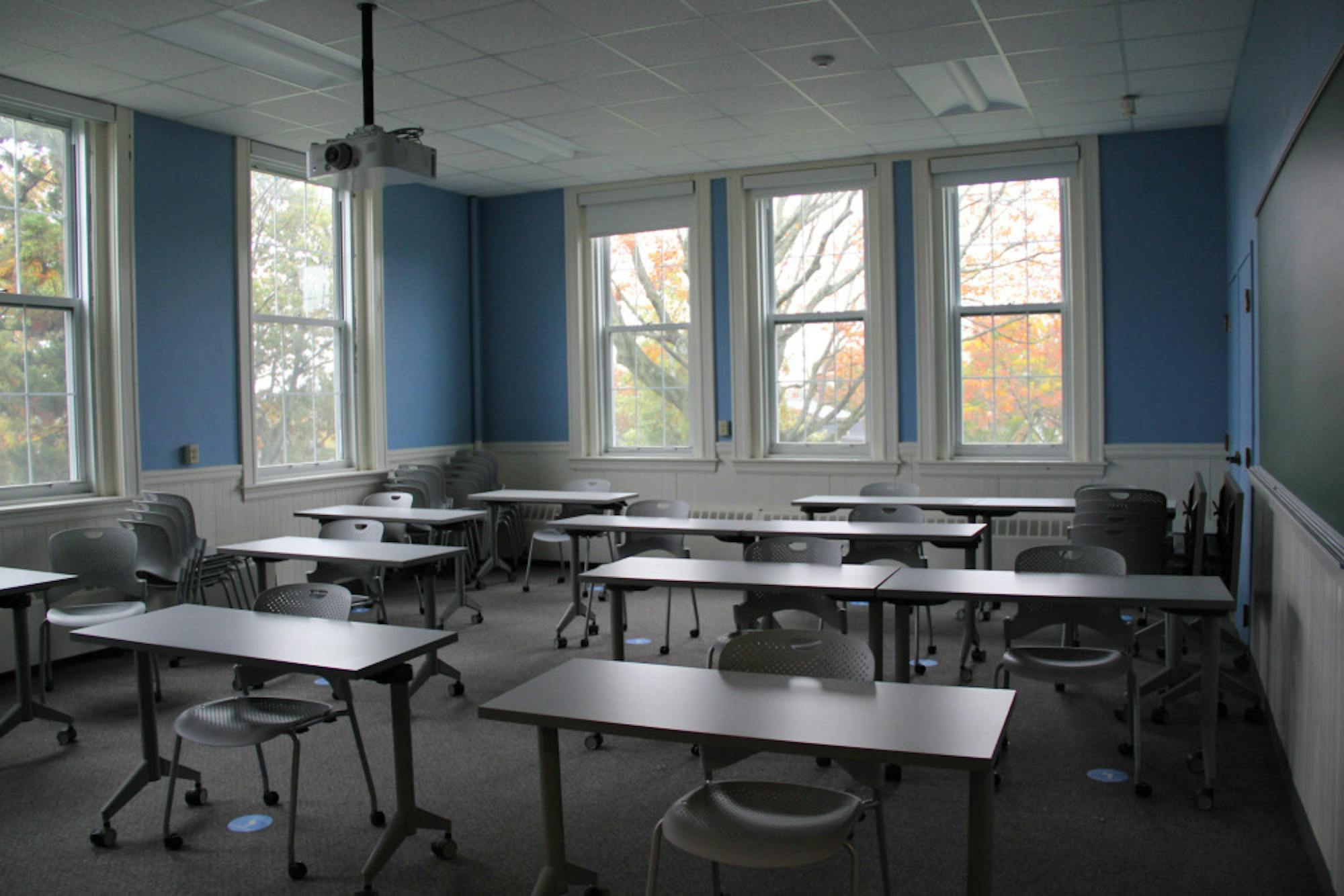As thousands of Tufts students returned to campus for the spring semester, just weeks after COVID-19 case counts broke records nationwide, the university tried to provide clarity regarding COVID-19 conditions on campus. Amid the uncertainty, changing course modalities and hundreds of students starting their semesters in isolation or quarantine, community members have attempted to anticipate and adapt to challenging on-campus conditions.
After unprecedentedly high COVID-19 transmission in January, Tufts administration officials announced the first three days of courses would take place virtually just a week and a half ahead of classes commencing.
“It was the correct decision to spread student arrivals over several days to allow onboarding over time and also allow general community prevalence to decrease,” University Infection Control Health Director Michael Jordanwrote in an email to the Daily.
Medical Director of Health Service Marie Caggiano echoed the effectiveness of the semester beginning with virtual courses.
“The decision to hold classes virtually for the first three days of the semester was intended to limit COVID exposure and illnesses among students, faculty, and staff, with the goal of avoiding more serious disruptions to campus life and operations," Caggiano wrote in an email to the Daily. "The decision, which has been effective, also has helped us to protect the medically vulnerable individuals within the Tufts community and in our host communities of Somerville, Medford, and Boston.”
With a week and a half to adjust course content to the virtual start of classes, some faculty across departments and with varying class sizes said they felt prepared to start their semesters.
David Coleman, who taught Gospel Choir virtually last academic year, felt it was easy to plan for the modality change.
“The idea of only having to teach the first week of classes virtually did not phase me," Coleman wrote in an email to the Daily. "Tufts provided me with the support to create 20 weeks of virtual content for my Canvas based course, and if need arises, I could easily switch to it again.”
John McCann, who teaches Wind Ensemble, also supported the university’s decision to start the semester virtually while remaining wary of COVID-19 conditions on campus.
“I love teaching in person but I want to balance that with efforts to stay uninfected," McCann wrote in an email to the Daily. "I don't mind that the school moved quickly to move to virtual as they reacted to information in real time.”
Many members of the faculty also hope the first three days of the semester will be the only virtual days of the semester. Clay Bennett, who lectures to 100 students enrolled in Organic Chemistry II, said that although he could teach his course virtually, much would be lost compared to in-person instruction.
“I am very hopeful we will not need to go remote again … after doing this for almost two years now, I feel that remote instruction is inferior to in-person instruction," Bennett wrote in an email to the Daily. "This is true both in terms of reaching the students and learning outcomes.”
Though even as courses return to in-person instruction, the university acknowledges creative accommodations will continue to be needed for students unable to attend class. Dean of Academic Affairs and Associate Dean for Diversity and Inclusion Heather Nathans said that these accommodations will need to be tailored course-to-course.
“We appreciate the creative solutions professors are devising to accommodate students who may have to isolate or quarantine," Nathans wrote in an email to the Daily. "For example, some classes will provide hybrid ... access throughout the term, while others will use it on an as-needed basis. Some will use notetakers and notes as well as other materials will be posted after each class. Some faculty are making extensive online office hours available each week to allow students who have to be absent to have more one-on-one guidance once their health improves and they're ready to return to schoolwork.”
However, less clarity exists for when faculty are unable to teach their courses. According to Tufts' COVID-19 dashboard, 12 faculty, staff and affiliates have tested positive in the past week, as of Jan. 28. Clay Bennett, Coleman and McCann didn’t offer specifics as to how their departments might navigate faculty sick with COVID-19.
“I can’t speak to classes during COVID, however, before the pandemic if a Professor was unable to teach a class someone else would step in,” Bennett wrote.
Meanwhile, McCann hopes he won’t have to navigate that challenge in the first place.
“I've been healthy and hope that continues,” McCann wrote.
For faculty, students and staff, the university feels confident in the safety of in-person classes, including large lecture courses.
“We have seen no evidence of in-person classroom transmission,” Jordan told the Daily.
For students unable to attend class, Dean of Academic Advising for the School of Engineering Jennifer Stephan outlined in an email how students should navigate short and long-term illness.
“We have asked faculty to include clear policies about illness and provide them on their syllabus, including sample language, so as a first step students should consult their syllabi for guidance," Stephan wrote. "We also provide instructions about what a student can do if they are ill … and students who are ill outside of quarantine and isolation may submit a short-term illness notification. If a student’s illness is severe, they should contact their advising dean for support and advocacy for flexibility.”






